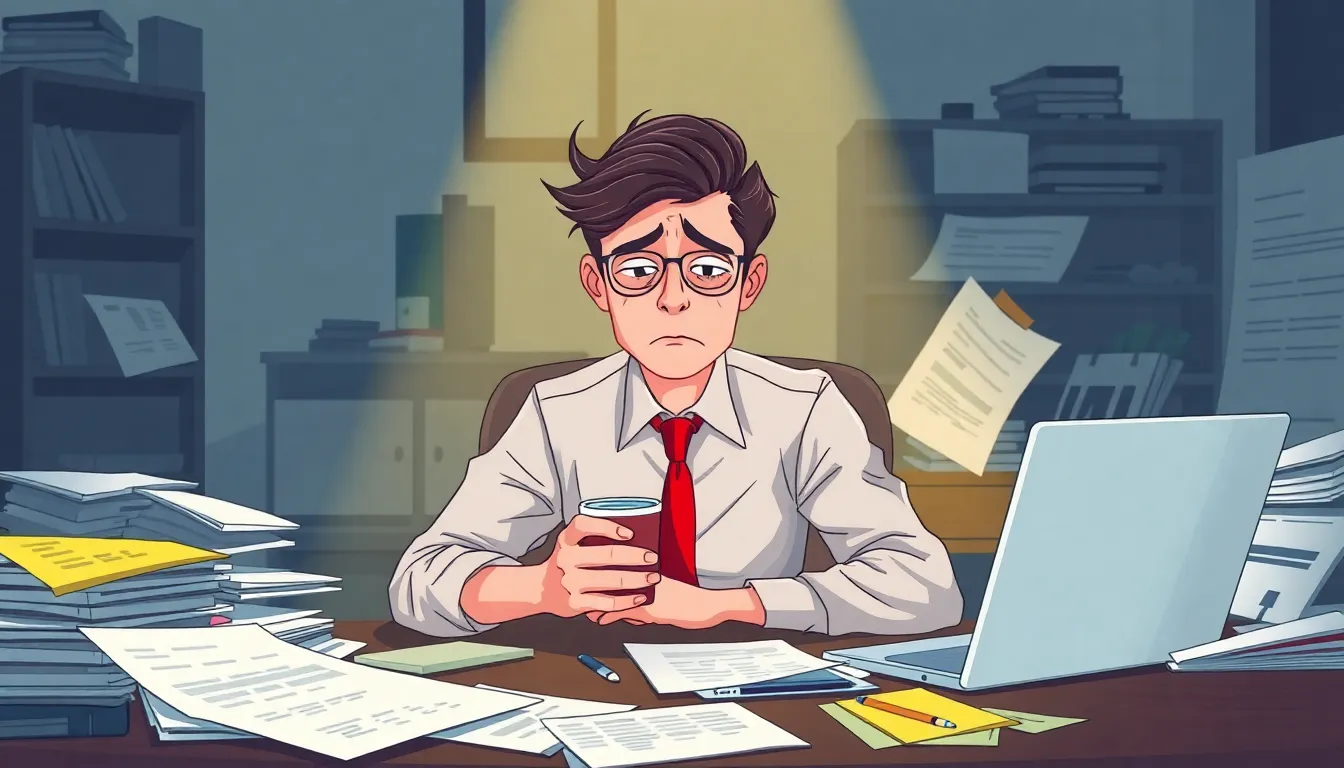In today’s fast-paced world, the grind culture has become the badge of honor for many. It’s that relentless pursuit of hustle that often leaves people wondering if they’re working hard or hardly working. But what does grind culture really mean? Is it a motivational mantra or just another way to glorify burnout?
Table of Contents
ToggleUnderstanding Grind Culture
Grind culture emphasizes relentless work and the hustle mentality. This approach often prioritizes productivity over well-being, leading individuals to question its long-term benefits.
Definition of Grind Culture
Grind culture refers to a mindset that glorifies excessive work and constant hustle. Individuals often equate their value with their output, viewing exhaustion as a badge of honor. This culture promotes an “always on” mentality, dictating that personal sacrifices are essential for professional success. Many view it through the lens of motivation; others see it as a pathway to burnout.
Origins and Evolution
Grind culture roots trace back to early industrial society, where hard work equated to economic progress. The emergence of the gig economy in the 2000s further popularized this mindset, emphasizing flexibility and the need for constant productivity. Influencers and social media platforms amplified these ideals in recent years, with success stories often highlighting endless work hours. The evolution reflects broader cultural shifts, where work-life balance often takes a back seat to ambition. As a result, many find themselves struggling to define success beyond monetary gain.
Characteristics of Grind Culture

Grind culture features several defining characteristics that shape individuals’ work habits and lifestyles.
Work Ethic and Mindset
Work ethic in grind culture emphasizes relentless dedication and ambition. Individuals often equate self-worth with productivity. Looking at this mindset, one can see how it glorifies hustling without recognizing the toll on mental health. The drive for success becomes paramount, often overshadowing the need for rest. Achieving goals forms the foundation of this culture. Many embrace long hours and a packed schedule as essential. Productivity metrics often replace personal fulfillment, leading to burnout.
Impact on Personal Life
Impact on personal life shows notable consequences of grind culture. Relationships often suffer due to time constraints. Prioritizing work leaves little room for family or friendships. Leisure activities become a rarity, and self-care vanishes amid the pursuit of achievement. Health issues can arise, including stress-related conditions and fatigue. Meanwhile, individuals may feel isolated despite professional success. Balancing work and life becomes increasingly challenging, yet necessary for overall well-being. Recognizing this imbalance represents a crucial step toward reclaiming a healthier lifestyle.
The Positive Aspects of Grind Culture
Grind culture offers several advantages that can drive personal and professional growth.
Motivation and Drive
Individuals often find new motivation within grind culture. The relentless pursuit of goals can inspire a sense of urgency to push boundaries. This motivation frequently converts into daily routines, enhancing time management skills. People within this culture tend to develop a strong work ethic, fostering resilience and determination. Those who embrace this mindset often embrace challenges and learn to overcome obstacles. The adrenaline of achieving milestones encourages a supportive community that shares similar aspirations.
Achievement and Success
Grind culture often leads to significant achievements in various fields. Many individuals experience rapid career advancements, leveraging their hard work to gain opportunities. Success often manifests not just in promotions but also in personal accomplishments, such as launching businesses or mastering new skills. High levels of productivity in grind culture enable individuals to achieve financial stability, which leads to greater independence. Celebrating small victories along the way reinforces motivation and maintains momentum toward larger goals. This culture creates a clear connection between effort and achievement, fostering a strong sense of pride and fulfillment.
The Negative Effects of Grind Culture
Grind culture often leads to significant negative consequences for individuals, impacting their mental health and overall quality of life.
Burnout and Mental Health
Burnout emerges as a major risk for those deeply entrenched in grind culture. Symptoms include chronic fatigue and decreased motivation, making it difficult to perform daily tasks. This relentless pursuit of productivity undermines mental well-being, resulting in anxiety and depression. Many people feel pressured to achieve perfection, increasing stress levels and leading to emotional exhaustion. Studies indicate that burnout affects 77% of professionals at some point in their careers. Recognizing signs of burnout is crucial to maintaining mental health. Seeking support and prioritizing self-care can help individuals navigate these challenges.
Work-Life Balance Challenges
Challenges in work-life balance manifest clearly in grind culture. Long hours and constant connectivity leave little time for personal relationships and leisure. Individuals often find themselves sacrificing quality time with family and friends in favor of work. This dynamic leads to a lack of fulfillment outside of professional endeavors. According to surveys, 60% of workers report feeling overworked, which exacerbates personal strain. Fostering a balance between work and personal life is essential for long-term happiness. Emphasizing boundaries allows individuals to recharge and improves their overall well-being.
Grind culture presents a complex landscape where ambition and dedication often clash with personal well-being. While it can fuel growth and inspire remarkable achievements, the risks associated with relentless productivity cannot be ignored. The pressure to constantly perform can lead to serious mental health challenges and strained relationships.
Recognizing the signs of burnout and prioritizing self-care is essential for maintaining a healthy work-life balance. Individuals must redefine success beyond mere output and find fulfillment in both professional and personal realms. Embracing a more sustainable approach to work can ultimately lead to greater happiness and overall well-being.


